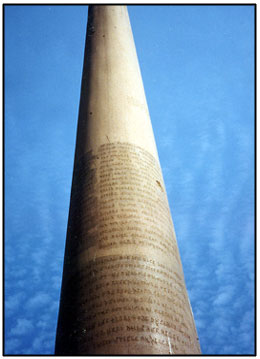Throughout the history of the Mauryan people, the kings have attempted to instill a sense of patriotism and allegiance in the populace. Chandragupta Maurya, the first Mauryan king, attempted to do this in several ways. He united India as one empire, expanded the Mauryan territory, and his magnificent palace at Pataliputra became a political symbol.
Ashoka also found several means to ensure the allegiance of his subject. He perpetrated the arts, in particular those related to Buddhism, which served the dual purpose of satisfying the people and spreading the Buddhist faith. Ashoka also allowed religions other than Buddhism, thus giving the people more freedom, and, as he stated in the Pillar Edicts shown below, he imported medicines and luxuries for the benefit of the people when those articles could not be attained within the empire for the benefit of the people.
